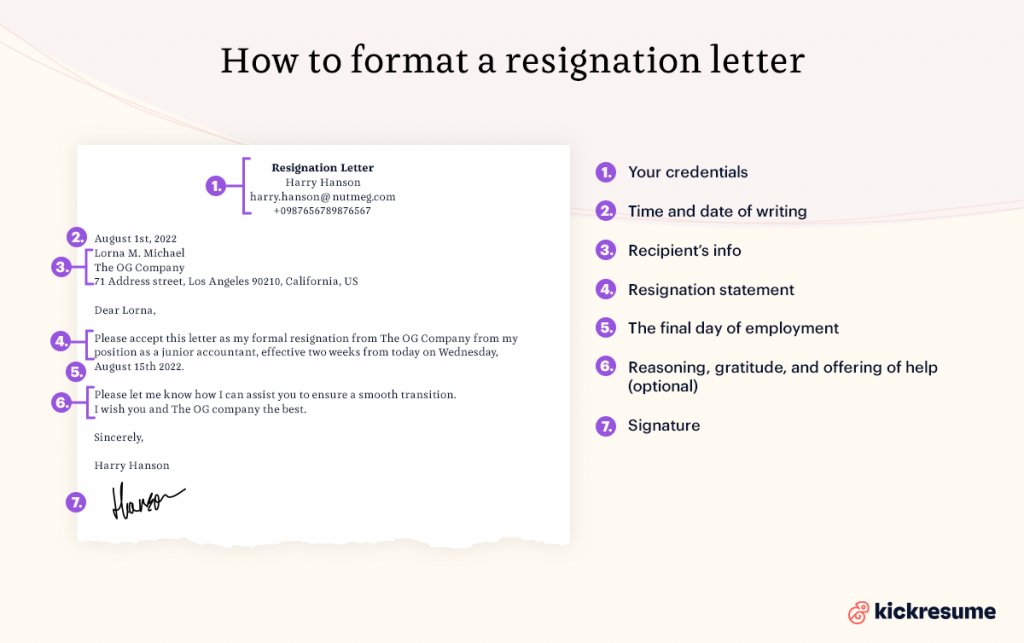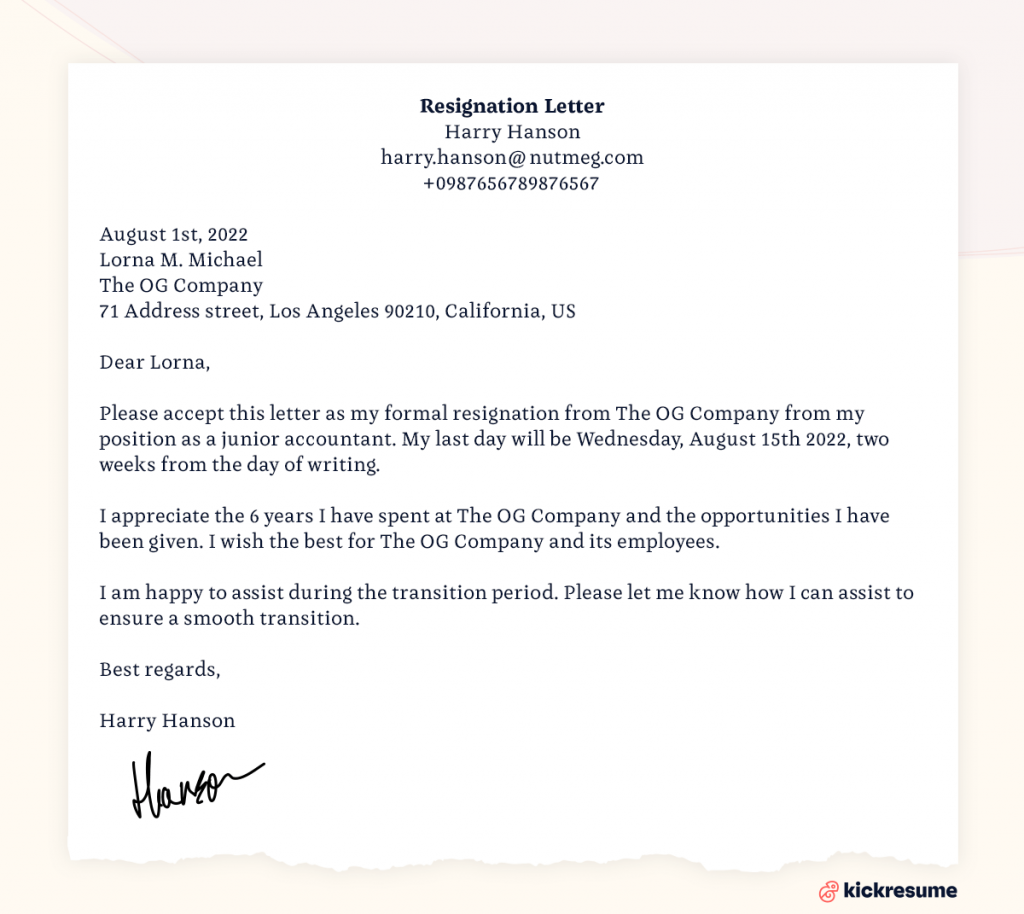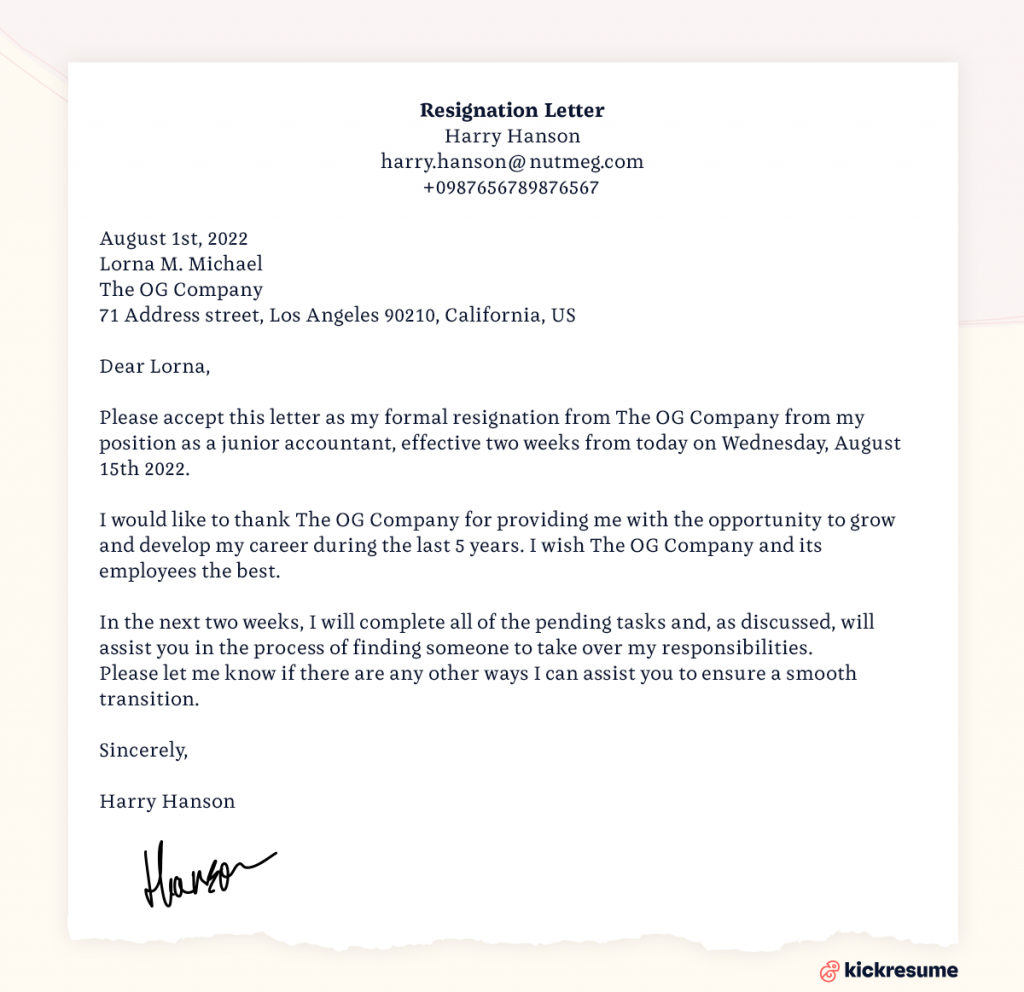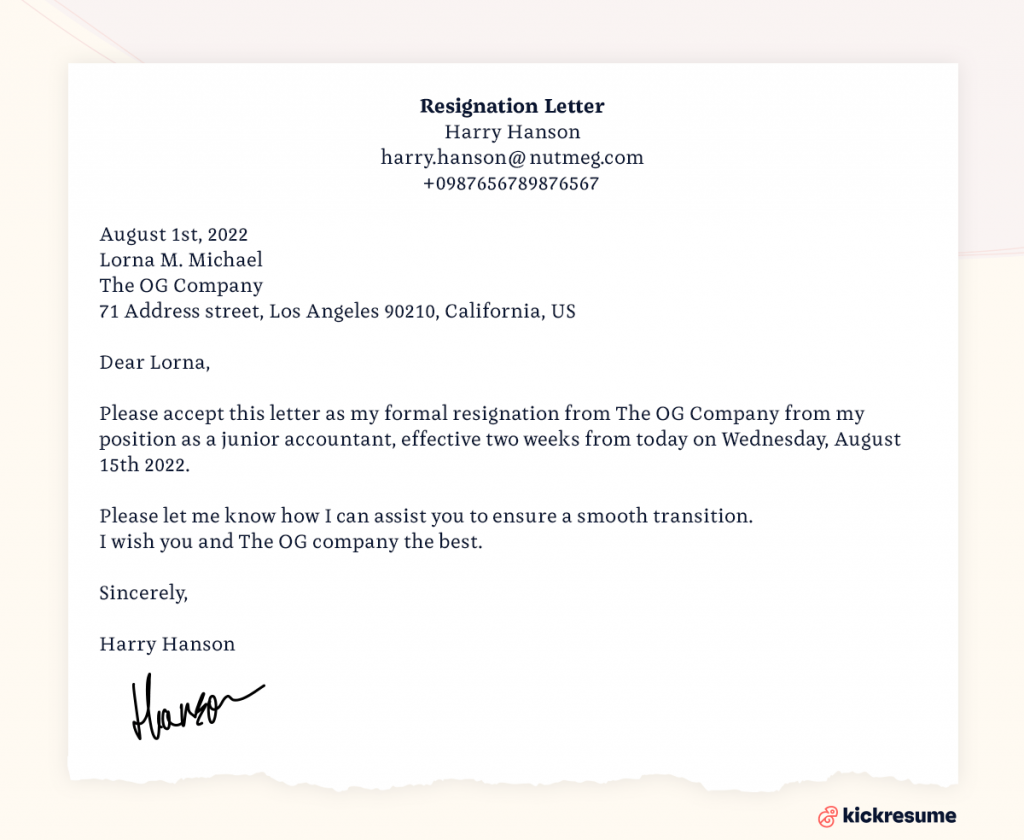


A recent Microsoft report found that 52% of the millennial and Gen Z workforce is likely to consider quitting and handing in their resignation letter in the coming year — up 3 percentage points since last year.
Resigning from a job can be bittersweet.
On one hand, you're probably excited about your new job and happy to leave your old one. On the other hand, there's still plenty of bureaucracy and uncomfortable conversations ahead of you.
Quitting a job looks easy in movies, however, in reality, there are some important steps you should follow.
So, how to quit a job in a legally-sound and graceful way?
Well, having a conversation with your employer, giving a two-week notice, and writing a resignation letter are the key steps that allow you to quit a job gracefully and without any potential conflicts.
This article will cover these steps in more detail, show you how to write a good resignation letter, and provide you with resignation letter templates and samples.
Click on a section to skip
Table of ContentsFirst things first, a resignation letter is the official formal document that lets your employer know you're quitting your job.
Now, why is this important if you've already told them in person?
Basically, anything that's been discussed but isn't recorded on paper can later be disputed, twisted, and lead to potential conflict. So, if you want to maintain professionality and make sure that your employer is sticking to what's been discussed, you should write a letter of resignation.
In short, it serves as a way to avoid any potential arguments.
Apart from being a formal document, a resignation letter also helps HR to stay organized. It serves as a reference for them, regarding details like the last day of employment or resignation notice period.
Last but not least, a letter of resignation can also include your reason for quitting. However, it's not always necessary.
You should write a resignation letter in a professional and formal way. Thus, there are some key components each letter should include. These are discussed in a later section “How to Write And Format a Resignation Letter”.
Later in the article, you will also find resignation letter samples and templates.
Do so right now with our mobile app.
A two weeks notice letter is sometimes called the two weeks resignation notice (letter). This means that, in essence, it's the same thing as a resignation letter.
Sometimes these two are referred to as separate documents, with a resignation letter stating the reasoning behind your departure, and a 2 weeks notice letter specifying the date of your last day of employment and your notice period.
However, there is no need to create two different documents if not specified otherwise. Doing so will only create more work for everyone involved and can cause confusion.
Instead, it's common practice to include all the necessary information in one document — the resignation letter.
Therefore, perhaps a better question is, what is a notice period?
A notice period is the period of time starting when you hand in your resignation letter until your last day at the job.
In some countries giving a notice period to your employer is legally binding, with individual employers specifying the length of the period in contracts.
However, in the US, neither the employer nor the employee has to give any notice for ending the working relationship. Basically, no legally binding notice period is required in the United States.
That being said, it's common courtesy that you provide a two weeks notice at least.
So, what do you need to do?
Hand in your resignation letter at least two weeks before ending your work relationship, including the end date in the letter. This will count as giving your employer a 2 weeks notice and will ensure a smooth transition period.

There are some key components each letter should include. These are:
The key components of a resignation letter outlined above can be tailored to specific circumstances of your departure from the job.
However, every basic resignation letter should, at minimum, include these.
This section includes templates and examples of specific resignation letters you can download and use to save you some time and nerves in this already stressful time.
This standard resignation letter sample contains all of the necessary components. It provides the information, clearly states the purpose, and shows appreciation for the company. Finally, it also offers help.

This basic resignation letter example shows an alternative way of phrasing your letter while keeping all of the necessary components.
It's good to mention some strategies you've discussed with your manager, such as what the plan is for your last two weeks.

A resignation letter is, after all, just a formal document. It only really needs to contain the dates for giving a two weeks notice and your resignation statement.
So, if you're really eager to leave and excited to resign from your old job, whatever the reason may be, it's completely okay to write a minimalistic resignation letter. No need to expand on anything else.

In the previous section, we've provided you with example resignation emails. In this section, we offer resignation letter templates for every occasion.
Simply copy the text and fill in your information and details.
[Your name], [Your phone number], [Your email]
[Date of writing]
[Name of recipient]
[Company name]
[Company address]
Dear [Name of recipient],
Please accept this letter as my formal resignation from [Company name] from my position as a [your position]. My last day will be [day of the week], [month, day, year], two weeks from today.
I would like to thank [Company name] for providing me with the opportunity to grow and develop my career during the last [number] years. I will especially remember fondly [a lovely habit in the company / a team building experience / a Christmas party]. I wish [Company name] and my team the best.
In the next two weeks, I will complete [the tasks you have left] and, as discussed, will assist you in the process of finding someone to take over my responsibilities.
Please let me know if there is anything else I can do.
[Your name]
In this section, we'll look at the common resignation letter mistakes to avoid and discuss what not to include in one.
While a resignation letter is a pretty short and standard document. But sometimes you may be tempted to go the extra mile and include things that are really best left out.
Without further ado, here are the common resignation letter mistakes:
Let's have a closer look at these mistakes and things to avoid when writing a resignation letter.
Even though the best way to hand in your resignation letter is in-person and on paper, sometimes this is not really possible.
Nowadays, more and more people work remotely or have a flexible work schedule, which makes it hard to meet in person.
In such cases, the best way to handle your resignation is via email. Aim to have an in-person discussion with your employer to inform them about your plan to resign. Then send them a resignation letter in an email.
This section provides helpful tips for crafting the best resignation email letter and offers a sample resignation email as well.
If you're still left wondering how to write a resignation email, please have a look at the sample resignation email below.
Email Subject Line: Resignation – [Your name]
Dear [Reporting/HR manager’s name],
I write to inform you that I am resigning as [your position] from [company name]. My last day will be [day of the week], [month, day, year], two weeks from today.
I am happy to assist during the transition period. Please let me know if there is anything I can do to make this transition easier.
You can always contact me using this email address or by calling [your phone number]
Leaving a job can be exciting, for sure, but oftentimes it can also be a bit sad. Especially if the reason you decided to leave was something other than a bad relationship with your colleagues.
In fact, according to the 2021 survey on workplace friendship and happiness, 57% of people say having a best friend in the workplace makes work more enjoyable. 22% feel more productive with friends.
Basically, I think we can all agree that having a work buddy does, indeed, make life easier and helps us strike a better work-life balance.
So, when the time comes and you have to leave behind your work friends, you shouldn't forget to say goodbye to them. You never know when you might need someone in your network to provide a helping hand.
And rather than having to send a goodbye email to 50 people individually, just send one that is really well-crafted to all of them at once.
Just like this one:
Subject line: My last day at XYZ Company
As you know by now, my time with XYZ Company comes to an end on Friday, the 24th.
It’s been an absolute pleasure working with each of you these past four years, and it’s a very bittersweet feeling I have right now while writing this email. While I’m excited about my next move, I will miss working with each of you.
Thank you for all your support, I greatly appreciate it. I would love to keep in touch, so feel free to shoot me an email at my personal email address – harryhanson@xyzxyz.com, or connect with me on LinkedIn.
I wish you all the best,
The two things you're obliged to say/do when resigning are giving your 2 weeks notice and telling your reporting manager that you're leaving the job. You're not obliged to explain why or what your next plans are. So what you should do is: 1) have a conversation with your boss or direct supervisor and 2) send a resignation letter two weeks before leaving, stating you're officially resigning and your last day of work. That's all.
Firstly, write the title “Resignation letter” and insert all of your credentials — your name, your mobile number, and your email. Next, write the date, the name of the recipient, and the company's name and address. Finally, open the email with a greeting, such as “Dear Jerry,”.
No need to get creative, simply go with “Sincerely,” or “Best regards,” and your name in the following line.
It's always best to check with someone from HR if there's a specific person in charge of resignations. If not, address the letter to your reporting manager or the head of HR. In smaller companies, you can address your resignation letter to your boss directly.